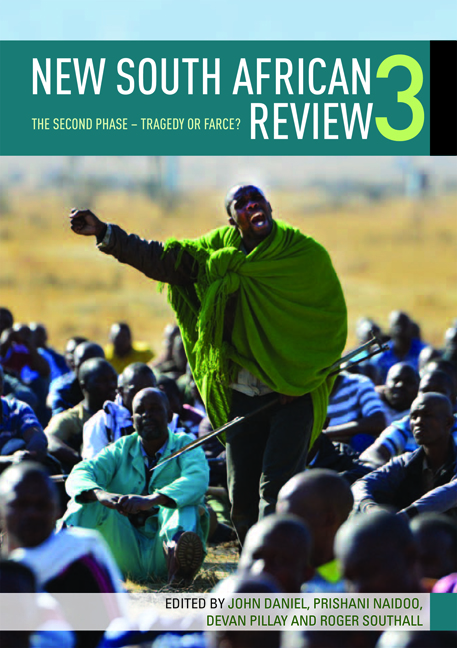Book contents
- Frontmatter
- Contents
- Preface
- Introduction: The second phase – tragedy or farce?
- PART 1 Party, Power and Class
- PART 2 Ecology, Economy and Labour
- Introduction: Ecology, economy and labour
- Chapter 5 Mass unemployment and the low-wage regime in South Africa
- Chapter 6 Nationalisation and the mines
- Chapter 7 Broad-based BEE? HCI's empowerment model and the syndicalist tradition
- Chapter 8 ‘Ask for a camel when you expect to get a goat’: Contentious politics and the climate justice movement
- Chapter 9 Hydraulic fracturing in South Africa: Correcting the democratic deficits
- PART THREE Public Policy and Social Practice
- PART 4 South Africa at Large
- Contributors
- Index
Introduction: Ecology, economy and labour
from PART 2 - Ecology, Economy and Labour
Published online by Cambridge University Press: 31 May 2019
- Frontmatter
- Contents
- Preface
- Introduction: The second phase – tragedy or farce?
- PART 1 Party, Power and Class
- PART 2 Ecology, Economy and Labour
- Introduction: Ecology, economy and labour
- Chapter 5 Mass unemployment and the low-wage regime in South Africa
- Chapter 6 Nationalisation and the mines
- Chapter 7 Broad-based BEE? HCI's empowerment model and the syndicalist tradition
- Chapter 8 ‘Ask for a camel when you expect to get a goat’: Contentious politics and the climate justice movement
- Chapter 9 Hydraulic fracturing in South Africa: Correcting the democratic deficits
- PART THREE Public Policy and Social Practice
- PART 4 South Africa at Large
- Contributors
- Index
Summary
Under Jacob Zuma's leadership, the African National Congress-led government continued along its schizophrenic development trajectory, trying to appease contradictory interests amid modest economic growth and rising social instability. The most powerful of all these interests remain the large corporations, which continue to shape public discourse around issues of ecology, economy and labour.
The chapters in this section speak to these issues. Dick Forslund presents a detailed exposition of the need for a wage-led growth path that tackles, head on, the neoliberal argument that low wages and inequality are necessary for economic growth, with the benefits trickling down to the working class in the long-term (by which time, as Keynes once said, we are all dead). Forslund argues instead that low wages and extreme inequality deprive the country of local markets and jobs. We should support unions in their demand for higher wages, tackle inequality by reducing the profit share of gross domestic product (GDP), abandon export-led growth that is based on wage compression, and move out of excessive reliance on extractive industries in favour of climate jobs that combine sustainable development with employment and decent work.
Martin Nicol continues the discussion on economic policy with a focus on the mining industry and the debate over nationalisation. He argues for nationalisation of a special type, and is sceptical about the feasibility of outright nationalisation (whereby the state takes ownership of mines) as well as bureaucratic state intervention as envisaged by the African National Congress (ANC) task team report. Nicol puts forward a more socially embedded alternative in which workers, citizens and the environment are central actors, ensuring that mineworkers obtain just rewards for their labour through a wage solidarity policy; improved living conditions for workers; a programme of adult education; and a mine veterans policy. He argues that mining with care and efficiency would alleviate unfavourable environmental consequences and provide full economic value, but this, he asserts, can only be achieved through independent union and community organisation, to build a countervailing power against private management and state cronyism, mismanagement and corruption.
- Type
- Chapter
- Information
- New South African Review 3The second phase - Tragedy or Farce?, pp. 92 - 94Publisher: Wits University PressPrint publication year: 2013

